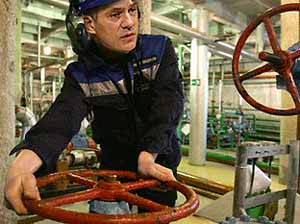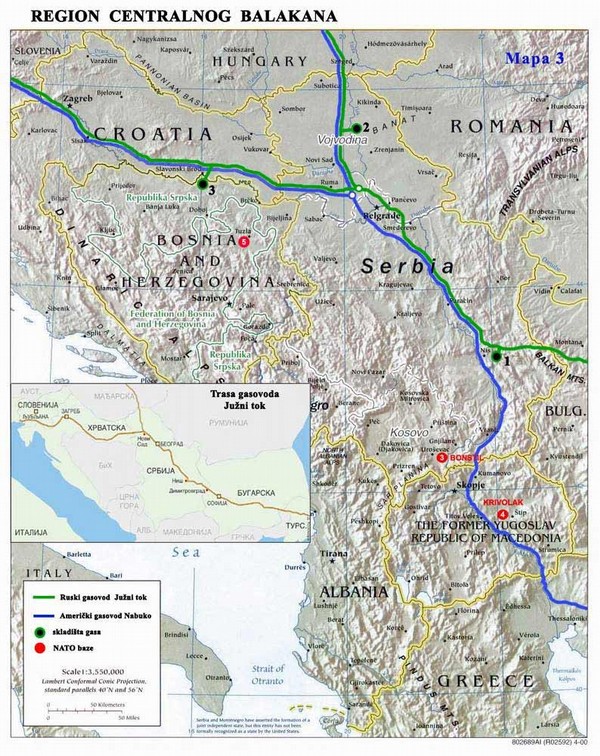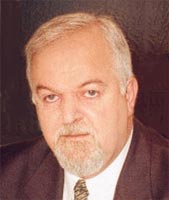07.05.2008
May 05, 2008 (the date of publication in Russian)
Zvonimir Trajkovic
AEROBATICS OF POLITICAL SWINDLE
After the elections of Serbia's new parliament, Tadic is likely to bury the energy agreement signed with Moscow
 THE AGREEMENT IN COLD STORAGE
THE AGREEMENT IN COLD STORAGE
On the eve of the scheduled elections, the Government of Serbia is deliberately sabotaging ratification of the bilateral agreement with Russia on the South Stream gas pipeline project. Mirko Cvetkovic, Minister of Finance, claimed that the issue was not even included into the agenda of the Parliament's session, "as it had no chance to gain the necessary majority of votes". According to his explanations, the ministers from the Democratic Party (DS), chaired by President Boris Tadic, and G-17 Plus Party, chaired by Mladjan Dinkic) abstained from the vote mainly under the pretext that the incumbent government is "technical" and is not legally competent for signing a document of so high significance. "We are going to put this issue to the vote after the new Parliament is elected", Cvetkovic explained.
Trade Minister Predrag Bubalo, representing the Democratic Party of Serbia (DSS), reminds that in fact, the energy agreement had been signed by the incumbent Prime Minister at the time when his government was fully competent, and therefore, there are no obstacles for initiating its ratification from the political and legal viewpoint.
Asked why the ratification was not even discussed since the agreement was signed in Moscow, Bubalo said that the ministers were probably "too concentrated on other urgent issues".
Those readers who are unaware of all the details of relationship between major Serbian political forces are probably surprised: why were the necessary majority of votes unavailable if the ministers, as well as the Premier, were present at the Government's meeting? How does this Government practically work if it decides every issue by voting, and what does the Prime Minister posturize in this Government? And, finally, why did the same "legally incompetent" Government that sabotages the agreement with Russia for almost half a year, easily sign the Agreement on Stabilization and Association with the European Union" days before the elections?
THE THEATER OF THREE ACTORS
At present, Serbia is ruled by three persons. Though all of them are marionettes of the West, each of them plays his own political role.
President Boris Tadic does not conceal his adoration with America and tries to demonstrate it under any convenient circumstances. As frequently as possible, he tells the public about the necessity of Serbia's entry in the EU and later in NATO, being echoed by most of the (supposedly) national newspapers and electronic media. Tadic imposes Euroatlantic policy as an indispensable option. The NATO issue is discussed with caution, but the EU is worshipped as a cult. Each time you switch on the TV you hear that "there is no alternative to membership in the EU".
Tadic also chairs the Democratic Party that includes all the Serbian tycoons. Speaking on the conditions of entry in the EU, he formally admits that Serbia can never countenance with the secession of Kosovo and Metohija, but immediately adds that his country is not going to protect its integrity with military force – even when nobody is asking his opinion.
Mladjan Dinkic, the next "pearl" of the Serbian establishment, is responsible for economic development and finances. He chairs the G-17 Plus Party that is reportedly dominated by a "community of experts". To realize what kind of "community" it really represents, one should recall the episode dated October 5, 2000, when Dinkic, then an Assistant Professor of the Belgrade University's Faculty of Economy, dashed into the office of the National Bank of Serbia with a team of AKM-armed gangsters, and appointed himself its executive manager.
Highly appraising Dinkic's zeal, the Western patrons entrusted him control over major financial flows, investments, and privatization. In fact, he is Serbia's financial dictator. He maintains close ties with top figures of all international financial institutions. He is granted a right to solely resolve issues like foreign debt, accumulation of currency reserves, and determining parameters of budget expenses. Dinkic has long expressed his personal attitude to the energy agreement with Russia: he says it is unprofitable, and therefore, it should not be ratified.
Vojislav Kostunica, chair of DSS, is playing a special role of a moderate nationalist and patriot. His mission is to propagate Great Serbian rhetoric, to posture as a staunch figure in the dialogue with the West but to do nothing. The smokescreen of "moderate nationalism" is used for manipulating minds of less informed persons, while pursuing fully pro-Western policy. In particular, Kostunica often declares that Kosovo is Serbia, though having done absolutely nothing to prevent Kosovo's secession in his eight-year capacity of President of Yugoslavia and Prime Minister of Serbia. In a critical situation, he pretends to be unaware of what is happening.
Kostunica regularly denounces DS, labeling it "a party of thieves", and regularly joins a coalition with the same DS after the parliamentary elections. None of the particular embezzlers, exposed by him, underwent criminal persecution. Today, Kostunica also displays "unawareness" of the reasons for sabotage of the Russia-Serbia agreement. He cannot explain why the Government did not bother to submit the agreement to the Parliament since January. Energy Minister Alexander Popovic, a functionary of Kostunica's party, is equally dumb on this issue.

WHOM IS THE GAS ROUTE RESERVED FOR?
What is in fact happening to the Serbian section of the South Stream project? Why is the whole Serbian establishment formally positive towards the project but reluctant to confirm the country's membership in South Stream? The explanation is quite banal: the route almost coincides with that of the long-discussed US-imposed gas project dubbed Nabucco. The profiles of Serbia's incumbent leaders make clear which of the two options they really prefer.
The reasons for deployment of the Bondsteel military base, the largest in the whole Europe, in Kosovo and Metohija, as well as for modernization of the existing Krivolak base in Macedonia, are equally clear. The United States that has spent $550mln for both objects requires control of the whole route of Nabucco. For the same purpose, they are going to deploy one more military base near Belgrade.
One more significant detail: according to the map of the project, Nabucco is supposed to pass across the territories of Bulgaria and Romania, but in fact, it is very complicated to construct the gas pipeline along this route due to peculiarities of the local landscape. It is much more convenient and incomparably cheaper to lay the pipeline across the Morava-Vardar valley than to cross several mountain ranges. In this case, Nabucco will follow the route of the existing highway (Corridor 10) that would enable to reduce the expenses due to advantages of delivery of construction materials.
Western analysts envisage Serbia as "smaller Russia" and a probable ally of Moscow in case Russia itself gets under attack. That is why all possible efforts are undertaken to separate the Serbian territory, dividing the native land of the Serbs with a maximum number of borders and thus completely except the "potential Balkan threat". The scenario of making Serbia energy-dependent from the West is a part of the same effort.
In case the South Stream project encompasses Serbia, and in case NIS, Serbia's national gasoline distributing company, is purchased by Russian business, it will be far more complicated for the West to blackmail the country with economic conditionalities. Besides, close economic cooperation is likely to improve the political ties between Moscow and Belgrade – an option which the West is committed to prevent. If Serbia agrees to host Russian ABM facilities, similar to those Washington is going to deploy in Poland and Czech, NATO's southern flank would acquire an inconvenient gap.
Still, incomes from war are the main issue of the proposed strategy. By means of constructing the trans-European Nabucco pipeline, incomes for US corporations could be guaranteed along with military objectives in Southern Europe, while Russia's incomes from gas exports would shrink. After all, the statement "you are as strong as your economy" has grounds.
Therefore, the political marionettes of Belgrade are zealously fulfilling their "hometask": to use all the possibilities to prevent implementation of Russia's South Stream. This task is fulfilled in a low-key, cautious manner, will all kinds of legal dodgery and bureaucratic procrastination, as an open game is fraught with a political outburst.
That is a really off-the-wall situation: while Russia ventures its international authority to protect Serbia’s suzerainty over Kosovo and Metohija, its plan to build a pipeline that would not only guarantee Serbia its energy security but provide significant incomes, is being sabotaged!
It is clear that the triple task of fulfilling all the US instructions, to cheat the nation, and to win one more m election campaign is very complicated. Still, the "heroes of tactics" hope to come off unscathed again, intending to postpone ratification of the Russia-Serbia agreement till the post-election period, and eventually to denounce it, declaring Serbia's involvement in South Stream "not sufficiently profitable" for the country.
THE POLITICAL PHARISEES SHOULD BE TAUGHT A LESSON
Summarizing these contemplations, we should drive political conclusions from the behavior of Serbian leaders. Why does Boris Tadic emphasize that he is not going to protect our compatriots in Kosovo and Metohija with military means, and why does Kostunica silently share this reluctance? Both seem to be concentrated on the same obsession: by any means, to exclude any possibility of military partnership of Russia and Serbia in the Balkans, or generally, Russian military presence in the region.
It is noteworthy that the Serbian military haven't lost their skills, and today's pensioners can be easily re-recruited. This fact is proven with the experience of NATO bombings in 1999, when Serbs protected themselves very professionally, despite absence of modern ABM launchers. In partnership with Russia, Serbia could promptly re-establish its military potential.
Realizing this possibility, NATO decision-makers are quite aware of Serbia's possibility to undermine their military-strategic plans along with their far-reaching energy projects like Nabucco. That is why the US assets in the Serbian establishment are so frantically trying to prevent Russia's breakthrough to the Balkans.
Is this reality perfectly understood in Russia? Will today's top officials of Serbia manage to continue to cheat a large part of their people, styling themselves as good friends of Russia and simultaneously sabotaging Russian projects? It is time for Russia to clarify the issue and to expose the sabotage of those who sign crucial agreements and then keep them in cold storage. This exposure would help the Serbs to get rid of the destructive rule of traitors of their country, and open the possibility of a full-fledged bilateral partnership of Serbs and Russians to the benefit and for the prosperity of both sides.
This article was written exclusively for RPMonitor.ru
 Information about the author:
Information about the author:
Zvonimir Trajkovic (http://www.trajkovic.co.yu), born 1948, Pristina, was one of the leaders of the Kosovo Serbs in 1990s. In 1990-93, he worked as a consultant at the office of President Slobodan Milosevic, in 1994-97 in the office of Republika Srpska's President Radovan Karadzic. In 1999-2000, he supported Vojislav Kostunica, breaking relations with him later in 2001. At present, Trajkovic is regarded as one of the most influential Serbian analysts.
Number of shows: 1378
 ENG
ENG 

 ENG
ENG 
